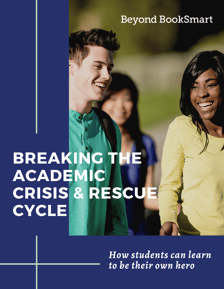Editor’s note: This week, we feature guest blogger Emily Toffelmire, Senior Manager of Educational Counseling for Bright Horizons College Coach. Please read more about Emily below.
Senior year of high school can be one of the most memorable and fun times in a young person’s life. But for students who put off all things college-app related until then, that first semester can be a stressful and sleep-deprived race against time. If you’re a current high school junior looking to actually enjoy 12th grade, here are four simple things you can start working on now to make the college application process much less stressful. 
1. Research Colleges
They may seem old school, but college guidebooks are still some of the most useful tools in the college research arsenal, especially if you’re just getting started. One of our favorites it the Fiske Guide, which provides surprisingly honest insight into hundreds of campuses. Fiske, with its emphasis on detailed narratives about each college, is nicely complemented by BigFuture, CollegeBoard’s portal for college data. There, you can find admission averages and requirements, as well as info on student body demographics and financial aid options.
As you peruse guidebooks and websites, you’ll start to figure out what matters to you and identify your own fit factors. Affordability, availability of particular majors, size of campus, distance from home, and the makeup of the student body are just some of the factors students focus on, and these are the factors that help students begin to shape their college list. You’ll probably start off with a long list, which you can whittle down by doing deeper research on each school. One of the best ways to do this deeper research? Virtual events.
2. “Visit” Campuses
Even in 2020, there are ways to get a personalized feel for a college thanks to admission offices’ pivot to virtual tours and information sessions. You can usually find these opportunities on a college’s admission website. While some of the options are informal (e.g. pre-recorded tours and 360 photo collections), be sure to register for the formal presentations, which are typically delivered by admission officers. Remember to take notes as you research or listen, as you can often incorporate details you learn into your university-specific supplemental essays later on.
3. Log your Activities
Most college applications require students to list their extracurricular activities. I’ve seen so many seniors wrack their brain as they try to remember just what in the world they were doing back in 9th grade. Do yourself a favor by opening up a new document and writing down everything you’ve done since the start of freshman year. And I mean everything: hobbies, sports, community service, school clubs, jobs, family responsibilities, summer programs and camps, outside courses, etc. Jot down a description of every activity and try to calculate approximately how much time you dedicated to each. You will thank yourself next year when you sit down to fill out your first application!
4. Brainstorm essay ideas
Great ideas rarely come when you sit down and tell yourself, “Okay, time for a great idea!” Instead, inspiration usually strikes when you least expect it. Rather than torture yourself with a blank piece of paper next year as you sit down to write your college essay, why not get yourself into the habit of writing down ideas now? Whether it’s a notes app on your phone or that cute journal you got as a gift but still haven’t cracked open, get yourself into a writing groove through weekly reflections. Need something to get you going? Check out the current Common Application essay prompts so you know what colleges are looking for. If you start writing now, you will have pages of potential essay topics awaiting you by summer.
The Takeaway
By devoting some time each week to one or more of these suggestions, you’ll set yourself up for a less stressful, less rushed summer and fall of 2021. And best of all? You'll be well on your way to conquering the college application process. Believe me: your 12th grade self will be eternally grateful!
Photo above by Jen Theodore on Unsplash
 Emily Toffelmire is Senior Manager of Educational Counseling at Bright Horizons College Coach, the nation’s leading provider of educational advisory services to organizations and families. At Bright Horizons College Coach, Emily delivers workshops and provides individual counseling on all aspects of the college admissions process. She brings to Bright Horizons years of experience in both secondary and post-secondary education. Emily has a Bachelor of Arts in Advertising and Public Relations from the University of Arkansas, and a Master’s of Education in Educational Counseling from the University of Nevada, Las Vegas.
Emily Toffelmire is Senior Manager of Educational Counseling at Bright Horizons College Coach, the nation’s leading provider of educational advisory services to organizations and families. At Bright Horizons College Coach, Emily delivers workshops and provides individual counseling on all aspects of the college admissions process. She brings to Bright Horizons years of experience in both secondary and post-secondary education. Emily has a Bachelor of Arts in Advertising and Public Relations from the University of Arkansas, and a Master’s of Education in Educational Counseling from the University of Nevada, Las Vegas.
 Our detailed guide reveals how and why students get stuck in academic crisis cycles, which can leave them dependent upon an adult to rescue them. Learn from two detailed case studies of our students what type of support helps students learn the skills they need to become confident and independent learners.
Our detailed guide reveals how and why students get stuck in academic crisis cycles, which can leave them dependent upon an adult to rescue them. Learn from two detailed case studies of our students what type of support helps students learn the skills they need to become confident and independent learners.

